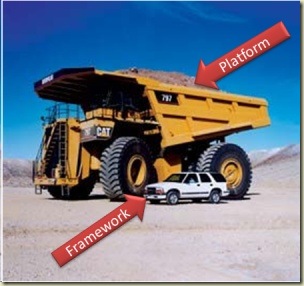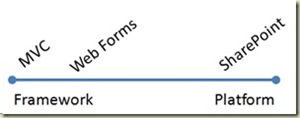Everyone who talks about ASP.NET MVC gets asked the question:
Should I use MVC or Web Forms?
There’s been quite a bit of debate on this topic, but in a couple years I don’t think it will matter.
… those who can count in binary, and those who don’t care.
The IT developer who doesn’t read blogs and works 8 hours a day in a Microsoft shop is either portrayed as a hero who produces business value, or vilified as a duct-taping Mortimer who produces a mess. The truth is somewhere in the middle, and the fact is that these developers look at MVC and Web Forms and see this:
… which is why so many people ask the question. There is no clear distinction. Most developers don’t have a passion for TDD or composite UIs – they just want to get the day’s batch transactions through the firewall and into a spreadsheet for the business folks. “I see two web frameworks. I can use either. Just tell me which one is best!!”.
Meanwhile…
There was a big SharePoint conference last week, and SharePoint is clearly positioning itself for global feature domination.
When you stack up SharePoint versus MVC or Web Forms, then everyone can see a contrast. One is a small framework to build on. The other is a giant platform that moves tons of data across the corporate landscape.

The SharePoint platform is an out-of-the-box-do-everything solution you tweak and augment for a particular environment. Some developers think this is great. Some developers think this is scary. At least the contrast makes for an easy decisions.
… those who like frameworks, and those who like platforms.
Developers who like platforms will want to use SharePoint. Install it. Customize it. Then watch end users collaborate in spreadsheets on numbers from Analysis Services.
Developers who like frameworks will want to use MVC. It’s light. It’s extensible. It leaves them in complete control.
Web Forms is caught in the middle. The abstraction is too heavy for framework lovers. At the same time, it’s not an out-of-the-box solution despite all the drag-n-drop data controls and pre-configured providers. It’s vulnerable to both sides and both SharePoint and MVC have momentum and excitement.

The question in the next decade won’t be: “MVC or Web Forms?”.
The question will be: “MVC or SharePoint?”
But nobody will ask the question, because the answer is easier to figure out.

 OdeToCode by K. Scott Allen
OdeToCode by K. Scott Allen